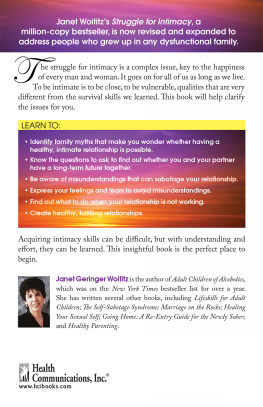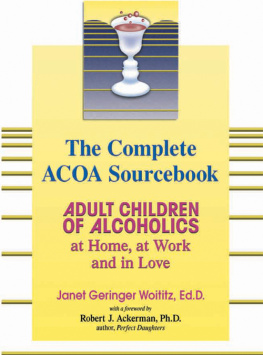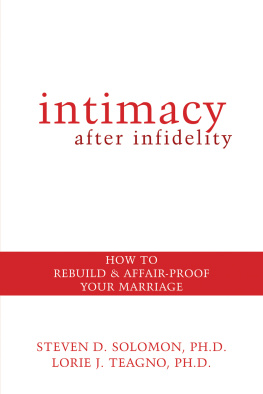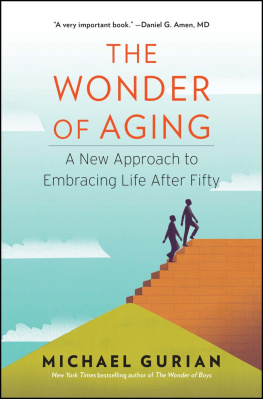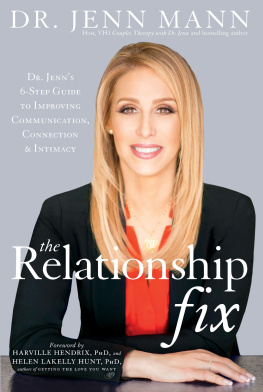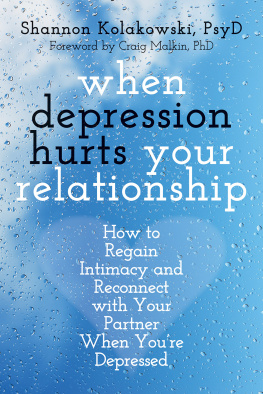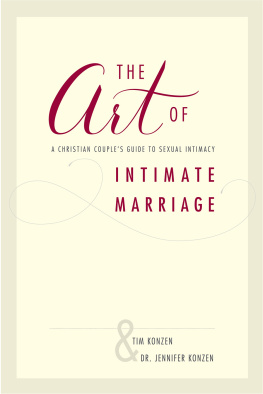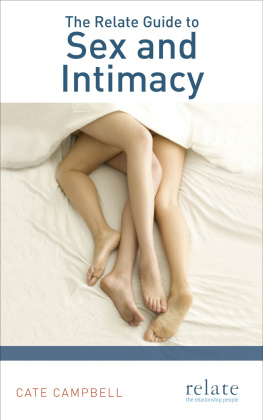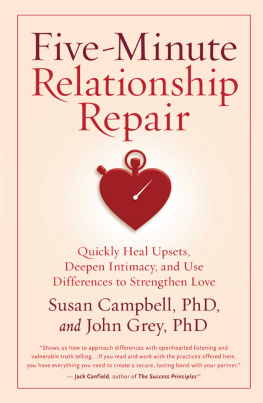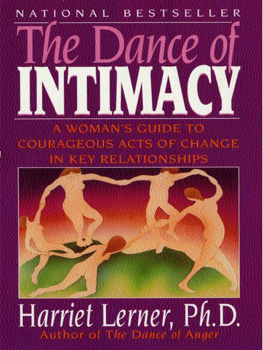Library of Congress Cataloging-in-Publication Data
is available through the Library of Congress
The Intimacy Struggle 1993 Janet Geringer Woititz
A revised and expanded version of The Struggle for Intimacy
1985 Janet Geringer Woititz
ISBN 13: 978-1-55874-277-2
ISBN 10: 1-55874-277-8
ISBN 13: 978-075731-151-2 (ePub)
ISBN 10: 0-75731-151-2 (ePub)
All rights reserved. Printed in the United States of America. No part of this publication may be reproduced, stored in a retrieval system, or transmitted in any form or by any means, electronic, mechanical, photocopying, recording, or otherwise, without the written permission of the publisher.
HCI, its logos, and marks are trademarks of Health Communications, Inc.
Publisher: Health Communications, Inc.
3201 S.W. 15th Street
Deerfield Beach, FL 334428190
Cover design by Larissa Hise Henoch
Interior formatting by Lawna Patterson Oldfield

Contents

Introduction
Everyone struggles with intimacy. Divorce statistics and the number of unhappy people we all know confirm that struggling with relationships is part of the human condition. If your family was dysfunctional in any way, you may have some very special problems and very special needs.
When I first wrote this book, I was addressing the needs of Adult Children of Alcoholics. As time went by, it became clear that the information was helpful and relevant for a much broader range of people looking for ways to make their relationships work and discovering that they had few skills. It was not easy.
Although the struggle for intimacy is not yours alone, for you the ways needed to fix the problems may be unique.
First, you were set up for the situation in which you now find yourself. You never had a chance to do it right because youve never experienced what doing it right looked like or felt like. It wasnt your fault if you always felt that other people knew some secret about successful relationships that you didnt know.
You may feel overwhelmingly guilty because you have been so ineffectual in your intimate relationships. Even if you learn nothing else from reading this book, please accept, right now, that you are not to blame for the pain you have sufferedand inflictedto this point.
You didnt have an effective role model for loving relationships. You have had to make it all up. What you did know is that you didnt want to be like your parents, but you didnt know how to filter the destructive actions from the good actions. So you created a fantasy about how ideal relationships work from a fanciful blend of what you imagined, saw at a distance or observed on TV.
All of us learn to relate to others by watching how our parents interacted with each other and with their children. Take a minute before you read further to create a visual picture for yourself of the interactions you observed between your parents. Think how you related to your mother, to your father. Do not judge. Just look objectively at your childhood experiences as you remember them. No matter how different your relationship behavior as an adult may look, it is, in large measure, a reaction to those experiences.
You will learn better ways to interact with others as you read this book. You will have new options and choices. And you will have a new responsibility to choose the better ways.
I want you to picture the model for your adult relationships which you learned while growing up in a family where the needs of the adults came before the needs of the children. The following pages will give you a broad overview. Think about your own childhood and your own family as you read them.
Chemical Dependency: One Example of the Insidious Deterioration of a Relationship
Where did it go wrong? What happened? Who is responsible? Where is the sense? What does it mean? Where will it all end? Circles and circles and circles and circlesall filled with confusion. Where did we go off the track? Is it possible to understand?
For each couple the beginning is different. Even so, the process that occurs in the chemically dependent marital relationshipand it is important to recognize that there are many other dysfunctional systems that have their own patterns of deteriorationis essentially the same. For the starting point lets take a look at the marriage vows. Most wedding services include the following statementsfor better or worsefor richer or poorerin sickness and in healthuntil death do us part. Maybe thats where the trouble began. Did you mean what you said when you said it? If you knew at that time that you were going to have not the better but the worse, not the health but the sickness, not the richer but the poorer and the potential suicide, would the love that you felt have made it worth it? You may say so, but I wonder. If you were more realistic than romantic, you may have interpreted the vows to mean through the bad as well as the good, assuming that the bad times would be transitory and the good ones permanent. This contract is one that is entered into in good faith, so there is no benefit of hindsight.
The idealizing that takes place when marriage is entered into is not realistic. Everyone idealizes the relationship at this time, not just those who will eventually live with chemical dependence or other dysfunction. Everyone does. The difference is that in the chemically dependent or dysfunctional relationship, reality continues to be distorted and, little by little, the couple loses touch with what a happy marital relationship is all about.
If the statistics are accurate, and they probably are understated, then a very large percentage of you grew up in chemically dependent or otherwise troubled households. This is an important fact to be aware of because it means you probably had no idea how to develop a healthy marital relationship to begin with. Your early attempts to do it right were built on models that you had never seen or experienced. Rather, they were built on models that you made up in your own head. Thus, the fancifulness of the marriage vows played right into the notion of It will be different for us than it was in my family.
Although the marital pattern created by alcoholism is discussed in detail here and will be used as the reference point throughout this book, it is important to reiterate that there are many other dysfunctional systems that have their own, similar patterns of deterioration. Workaholism is an addictive process which tends to alienate families. Workaholism occurs when the enthusiasm to work hard in order to save and plan for the future, experienced in the beginning of a growing marriage, deteriorates to the point where one partner is spending so much of his time at work, bringing home so much work and is talking on the phone so much of the time he is home that the other person feels deserted.
The alienation process here is slow and the rationalizations very strong: Im doing this for us. Its not fair to come down on me when Im only trying to earn a living. Im tired at the end of the day, too tired to go out socially or to sit down and have a conversation and you need to be more understanding. The spouse will feel very guilty and the resentment will build gradually. There is no time for intimacy here, and no model for children of a healthy, intimate relationship.
Another situation which is potentially perilous is a situation where there are economic reversals. If a family is used to a certain standard of living and then the major job is lost and that standard abruptly changes, the stress of those changes can be played out within the family system. Although one would want to be supportive and although a couple would want to bolster each other up during these times, the pressure can overwhelm.

